- Home
- Upton Sinclair
Presidential Agent Page 21
Presidential Agent Read online
Page 21
III
At Bienvenu there was a letter from Rick in Geneva, where he had been sent by the editor of a leading weekly to report the opening ceremonies of the League of Nations Assembly. Rick enclosed a carbon copy of his first article, in which with quiet irony he contrasted the external splendors of the proceedings with their intellectual and moral bankruptcy. The British Indian ruler, Aga Khan, reputed to be the richest man in the world, was to be chosen President of this Eighteenth Assembly. He was a Moslem god, but the most modern of divinities, owning a famous racing stable and contributing twenty-five hundred quarts of champagne for the Geneva festivities. He spent most of his time on the Riviera, where Lanny had met him many times; he had admirable manners, and gave priceless jewels to the ladies who won his favor.
The new Palace of the League of Nations had been ten years a-building and had cost fifteen millions of dollars. It was magnificent beyond telling, and its murals, paid for by the Spanish republic, had as their subject the freeing of mankind from intolerance and tyranny; alas, the painter had gone over to the Franco side, and the Spanish republic was not sending delegates to the Assembly, on account of the failure of the League to act against Franco’s intolerance and tyranny. Rick predicted that this Assembly would demand the withdrawal of foreign troops from Spain, and also the ending of Japanese attacks upon China, but that it would be powerless to enforce its decrees and not one of its members would move to make them good. All this took a couple of months to happen, and meantime the delegates from China went home, and Rick went home also, telling his readers that it was no longer worth his while to write, or theirs to read, about the doings of the League of Nations.
Lanny stayed at his mother’s home long enough to have another session with Madame. Alas, he got nothing but the wearisome Claribel, and fragments of he knew not what; confused voices, names which he had never heard, references to happenings of no consequence; the contents of a mental junkshop, with goods molded and cracked and covered with dust. Lanny jotted it down in his notebook, and after a month or two would read it over to see if there were evidences of precognition, such as he had read about in the books of J. W. Dunne. But he didn’t stay for more of it now, and wondered if Madame’s gift was petering out. Poor soul, she was always afraid that would happen, and Lanny would console her, saying: “You have given us our money’s worth already.”
IV
Early in the morning Lanny stepped into his self-moving magic chariot, and this time he didn’t stop at Le Creusot, but went straight through, reaching Paris in the late afternoon. His hands trembled as he glanced through his mail at his hotel. Nothing from Trudi; nothing from Professor Adler; only the silence of the tomb. So he phoned to his uncle. Having decided that it was no longer wise to visit that center of sedition, he had appointed a certain street corner as a rendezvous. Now he drove to the spot and took the elderly painter into his car.
They rolled peacefully about the drives of the Bois while Jesse made his report. He had an investigator—“Let’s call him Jean,” he said—“a dependable fellow who is a good mixer and knows how to get acquainted with all sorts of people. I didn’t tell him what I expected to find; I just said I wanted to know what those Nazis are doing in that château and why there have to be so many of them. Jean found an old unused water-mill near the village, and he read up on the subject and took up the project of leasing it and putting it back into service. So he has an excuse to visit the peasants and ask if they would bring their grain to him; he sits in the bistro in the evening and chats with everybody, and the first crack out of the box they were telling him that it was no use expecting the patronage of the château, because those Germans have nothing to do with anybody. The village is bitter against them because men and women who had been employed there, and their fathers and grandfathers before them, were turned off without ceremony. That is an advantage to us, as you can see.”
“Possibly a disadvantage,” remarked Lanny. “They will be predisposed to believe whatever they hear, provided it is bad.”
“Yes; but with hundreds of pairs of eyes watching, they can’t fail to pick up some valid details. The Germans don’t trade in the neighborhood, but bring all their supplies from Paris. One of their camions had a breakdown and halted by the roadside at night, and a peasant driving his cart stopped to see if he could help. Of course he was full of curiosity—and you know how sly they can be. The Germans said they didn’t want any help, but he stood there offering comments, discussing the prospects of a storm, and so on; obsequious, but stubborn, and of course they couldn’t order him off a highway in France. Tell me, is the party you are interested in a woman?”
“Why?”
“The peasant declares he heard a groan from inside the camion, and it seemed a high-pitched voice. It was a covered vehicle, and he couldn’t see anything but what the Nazis illuminated with their flashlights.”
“Do the people of the neighborhood believe there are prisoners in the château?”
“They are quite convinced of it. But of course it’s a natural assumption; it’s what the Nazis do wherever they go. A district like this, close to Paris, is tinged with Red, and naturally the Reds believe the worst.”
“Has Jean met any party comrades?”
“Several, he tells me. He has let them have the idea that his sympathies lie their way.”
“Did he follow up my tip about the laundry?”
“He has made contacts there. The Nazis bring the laundry and call for it, so there’s no chance of getting inside by that method.”
“Is he being careful not to excite suspicions by too many questions?”
“He’s a clever chap, and used to the role of idle gossiper. Once you have established yourself as a Frenchman of the left, able to remember the last war and what les sales boches did, you are permitted to hate them. Que le diable font-ils dans la patrie? You can be sure it’s nothing good, and that they are paying the pigs of politicians a lot of money to let them stay. That is the way Frenchmen talk in the bistros nowadays; they don’t trust any of their cochons, and all they value politically is the privilege of calling them names.”
V
Lanny said: “What you tell me fits in with the story I have heard, so let us get more. I have to run over to Chicago to sell a picture. I expect to be back in a couple of weeks and perhaps one or two days over. Meantime, have your man keep on working. We should have detail maps of the district, and a plan of the château. What could that mill be rented for?”
“I don’t know, but it shouldn’t be much. It is so run down as to be almost useless.”
“We can lease it with an option to buy, and we can take our time and do a lot of discussing about fixing it up. Meantime, we have a rendezvous—and the Nazis would find it as hard to get into our place as we into theirs.”
Lanny went to the bank next morning and drew out thirty thousand francs in the form of thirty crisp new notes. They looked immensely impressive, and even Americans had a tendency to be fooled and to forget that a franc was only three or four cents. (It had been doing a lot of fluctuating.) Lanny preferred to handle the sum in cash, because he was sure the banks were co-operating with the police authorities, and the last thing he wanted was to have anyone get the idea that he was putting up money for the Red cause. His uncle promised to stick the money away in an empty ginger-jar, and to change every single one of the notes before he paid them in any sort of transaction.
Lanny called Kurt on the telephone. Speaking English, he said: “On my way to Bienvenu I had lunch with Baron Tailor.” Kurt knew both the English language and French geography, and would understand the reason for not saying Schneider. “I told him of my talk with you and he was interested and wants to hear more on the subject. You can follow that up if you wish.” Lanny was sure that Kurt was never going to admit to him, directly or indirectly, that the Nazis were paying money to the Hooded Men; the proper role for Lanny was to be free from curiosity on all delicate subjects.
He went on to say that he
had visited the château near Paris and had found some paintings of great interest. Also he had met a delightful young German, Leutnant Rörich. “What wonderful young men you have managed to train, Kurt! A quite new sort of men. Unglaublich!” He knew how Kurt would beam at that. “He reminded me all the time of Heinrich Jung. You remember when Heinrich was at that age, so full of his early enthusiasm for the Führer?”
They talked about old times for a bit, and at last Lanny informed his friend: “I am running over to Chicago to dispose of a painting. I am taking the Bremen, because it will be like a visit to Germany. I have been missing it.” He inquired if there was anything he could do for his friend in either New York or Chicago, but Kurt said there wasn’t. Glückliche Überfahrt!
VI
Lanny took a boat-train for Cherbourg. The great German liner was stopping there that night; she was as fast as any, and Lanny wanted to get the smell of Naziland after two years. Also he might pick up some items of information. He had three purposes in the trip: to sell his precious old master, which he now had carefully wrapped in oilcloth; to tell his father about the interview with Schneider and get due credit for this coup; and finally to visit Washington and make sure that his secret communications were being received and read. He hadn’t dared make carbon copies of any of them, but he had them all in his head.
The steamer was magnificent and shiny, like everything the Nazis were displaying, and every German on board was as proud of it as of all the other triumphs of the Neue Ordnung. The vessel was crowded, for the most part with Americans on their way home from a summer of culture seeking and finding; they were loaded with it and couldn’t resist unloading upon Lanny, even when they learned that he had lived in Europe most of his life. He had been able to get on board at the last moment by sharing the bridal suite, the most expensive apartment, with a manufacturer of machine tools from a city of Indiana. He chanced to meet this large expansive gentleman in the steamship office; they both had money, but shrank from paying twenty-one hundred dollars for a five-day journey, and decided to stand each other’s company. The gentleman was a devout Catholic and hung a crucifix over his bedpost as soon as he opened his bags; it had been blessed by a bishop, and would keep him from being seasick in spite of equinoctial storms. He had recently kissed the Pope’s toe, and received a rather gaudy medal for his contributions to the building of a cathedral.
Opposite to Lanny at the table sat a plump widow who owned most of the stock of a manufacturing plant in Camden, New Jersey. She had with her a lovely daughter, a bold striking brunette just out of Vassar. How Beauty Budd’s heart would have thumped if she had been there, and how quickly she would have convinced the mother of the super-eligibility of her brilliant son. Mother and daughter had been doing the grand tour, and it had included at the end a ten-day excursion into Russia, entering by way of Leningrad and coming out by Moscow. The only things they had enjoyed had been the paintings, and the palace of the Tsar and Tsarina with the bedrooms and all the knickknacks and bric-a-brac untouched. All the rest of Russia was dirt and bad smells, dingy clothing and water-spigots out of order. Women actually working on the railroads, shoveling dirt! Women paddling along barefooted in the dusty roads, following their men! Most horrible!
A relief to come out into Poland, and find the stations with counters loaded with every sort of delicious foods. And the army officers, with such gorgeous sky-blue uniforms! The ladies had spent a whole day in Warsaw and hadn’t seen a sign of any slums; they hadn’t heard there was a ghetto, and were quite sure that stories of pogroms were just made up by the hateful Bolsheviks. Lanny had learned to listen to such opinions and smile amiably. In his mind was the thought: “You should have stayed a while longer, Miss Gwendolyn, and married one of those uniforms!”
VII
Studying the passenger list of the steamer, Lanny noted the name of Forrest Quadratt, the poet whom he had met at Irma’s Long Island home; American-born of German descent, and said to be a left-handed relative of the Kaiser. He had been a lifelong devotee of Machtpolitik and Lanny was sure that he was now a well-paid agent of the Nazis. Their last meeting had been in the days of Lanny’s suppressed quarrel with Irma, and he couldn’t be sure that she hadn’t given the man some hint of her husband’s distressing political attitude. Whenever Lanny suspected anything like that, he had a deft way of covering it up; he would say: “I used to have a Pinkish tinge to my thinking, but what I have learned about the wholesale purges in Russia has cured me. I realize now that Europe has to be protected from the Asiatic hordes, and nobody but the Germans can do it.”
The one-time decadent poet—he said that he had “given up the genius business”—was in his fifties; rather small and stoop-shouldered, nearsighted and wearing thick glasses through which he peered out at you; leaning forward and speaking with rapidity—English, French, or German, wie Sie wollen, comme vous voulez, as you like it. His hand was soft, warm, and moist, and so was his voice. He had sinned heavily and written about it boldly; also he had read the literature of sin, and was cynical about what was in the hearts of men, and what women were doing when they shut and locked the doors of steamship cabins.
Like all the Nazis, Quadratt was convinced that the mass of mankind was made up of dolts and imbeciles who had to be given orders and made to obey. He considered that the Germans were the proper people to take charge of Europe and bring it out of the Middle Ages. The British had their huge empire, and should be content with that and not make Germany the victim of their jealousy and greed. As for the United States, they were the people who most resembled Germans, and should be their spiritual brothers, as they already were their blood brothers—owing to the vast immigration of Germans, who had brought most of the new country’s culture. Let America be content with the Western Hemisphere, upon which the Germans had no designs whatever. If you asked Quadratt why the German propagandists were so active in all South American countries, he would answer that their attitude was purely defensive, a result of America’s having deprived Germany of her hard-won victory in the last war.
But Lanny Budd asked no questions of that sort. Lanny Budd was the spiritual brother of the Nazis, an art expert who had sold pictures for General Göring and shot stags with him; an amateur pianist who had played the Moonlight Sonata for the Führer; a gentleman of leisure and fashion who had been the friend and patron of Germany’s greatest living Komponist. In Lanny’s pocketbook was a clipping from the Münchner Neueste Nachrichten, telling how the American Kunstsachverständiger was directing a one-man show of his former stepfather’s paintings in Munich, and how he had taken the chef-d’æuvre to the Führer at the Braune Haus and the Führer had certified to the validity of the art work. This clipping included a photograph of the distinguished American, and thus served as a Legitimationspapier to any Nazi anywhere.
Lanny wished to make himself rock-solid with this Nummer-Eins propagandist in the land of Lanny’s fathers; he swore him to secrecy as to the source of his information and then revealed the new revolutionary movement to abolish the Third Republic of France and put an end to the alliance with Russia. Quadratt pretended to know all about it, but obviously he knew very little, and Lanny let himself be deftly led to make revelations; the Nazi agent enjoyed getting the better of anyone, and the presidential agent enjoyed watching a smooth psychological trickster doing his stuff. Lanny was sure it couldn’t do any harm for Quadratt to possess this information, and it was a way of getting a Nazi to unveil his innermost soul.
The talk took place in the ex-poet’s stateroom, where they could be sure of privacy—at least the ex-poet could be sure. Lanny wondered if there might be a dictaphone, but decided that it wouldn’t matter, for he wasn’t naming the de Bruynes or Schneider; only those French politicians whom the Nazis had on their payroll. After this steamship intimacy had progressed to the proper point, Lanny ventured: “We’re going to have to do something of the same sort in America, I very much fear.”
The Kaiser’s left-handed relative didn’t conside
r it necessary to play shy like Kurt Meissner; what he played was sad, for he was a tenderhearted man, a lover of culture and peace, and he hated to see violence and cruelty anywhere. Said he: “I am afraid that you are right, Mr. Budd. There are elements in every country today which are deliberately or otherwise playing the Moscow game, and they have no intention of letting themselves be put down without a struggle.”
Lanny knew that Quadratt had sounded out Robbie Budd on the question of the Hooded Men of America and the possibility of their being used to overthrow the New Deal. Now Robbie’s son threw out a piece of bait, and was amused to see the speed with which the peace-loving Nazi grabbed it. Lanny said he had heard the subject discussed in American drawing-rooms and that some of the most prominent victims of the New Deal were now in a mood to put up money and save themselves from further victimization. Quadratt made plain that he wanted nothing in the world so much as to know the location of those drawing-rooms; and Lanny promised to invite these wealthy friends to meet Quadratt and hear what he had to suggest.
The son of Budd-Erling went on to discuss some of the more prominent public enemies of the New Deal: Mr. Henry Ford, who had spent a fortune to awaken Americans to the menace of Jewish Imperialism; Colonel McCormick of Chicago, lavish in subsidizing those groups which were struggling to keep America out of European affairs; Mr. Hearst, who had interviewed the Führer just recently, and whose newspapers were the Rock of Ages for all friends and sympathizers of National Socialism; Mrs. Elizabeth Dilling, who ran a sort of volunteer intelligence service and had a dossier on every man or woman who had ever given aid or comfort to Moscow. Lanny said he hadn’t met any of these persons, but would like very much to meet Hearst and the wife of Ford for business reasons, since both were noted for their interest in painting. Did Quadratt know of any way to bring him together with either of these highly inaccessible persons?

 Prince Hagen
Prince Hagen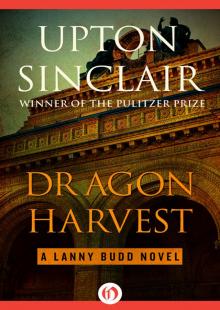 Dragon Harvest
Dragon Harvest The Jungle
The Jungle Sylvia's Marriage
Sylvia's Marriage Oil! A Novel by Upton Sinclair
Oil! A Novel by Upton Sinclair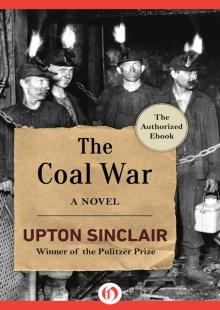 The Coal War: A Novel
The Coal War: A Novel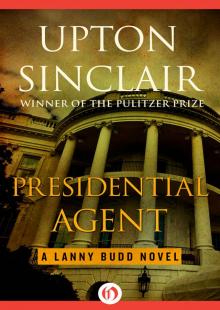 Presidential Agent
Presidential Agent World's End
World's End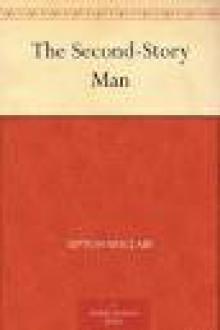 The Second-Story Man
The Second-Story Man O Shepherd, Speak!
O Shepherd, Speak!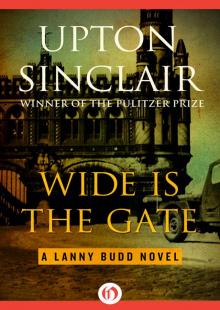 Wide Is the Gate
Wide Is the Gate The Return of Lanny Budd
The Return of Lanny Budd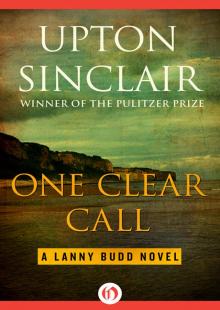 One Clear Call I
One Clear Call I 100%: the Story of a Patriot
100%: the Story of a Patriot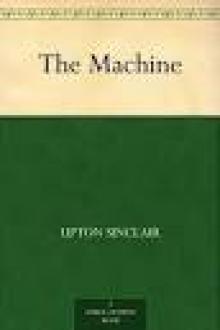 The Machine
The Machine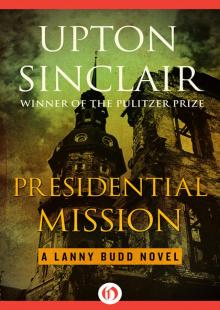 Presidential Mission
Presidential Mission A Cadet's Honor: Mark Mallory's Heroism
A Cadet's Honor: Mark Mallory's Heroism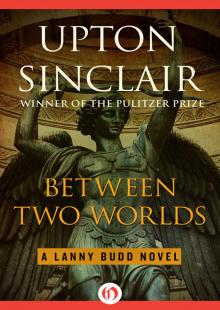 Between Two Worlds
Between Two Worlds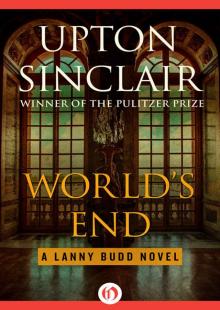 World's End (The Lanny Budd Novels)
World's End (The Lanny Budd Novels)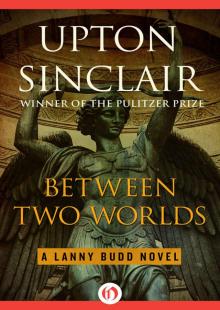 Between Two Worlds (The Lanny Budd Novels)
Between Two Worlds (The Lanny Budd Novels)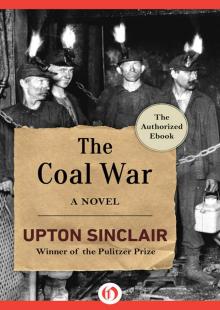 The Coal War
The Coal War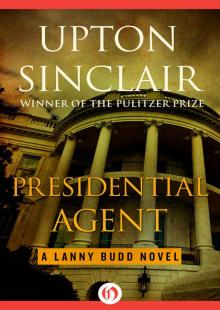 Presidential Agent (The Lanny Budd Novels)
Presidential Agent (The Lanny Budd Novels) Oil (filmed as There Will Be Blood)
Oil (filmed as There Will Be Blood)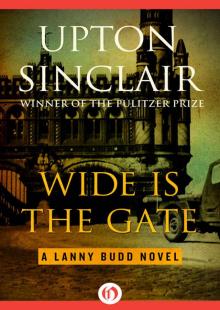 Wide Is the Gate (The Lanny Budd Novels)
Wide Is the Gate (The Lanny Budd Novels)